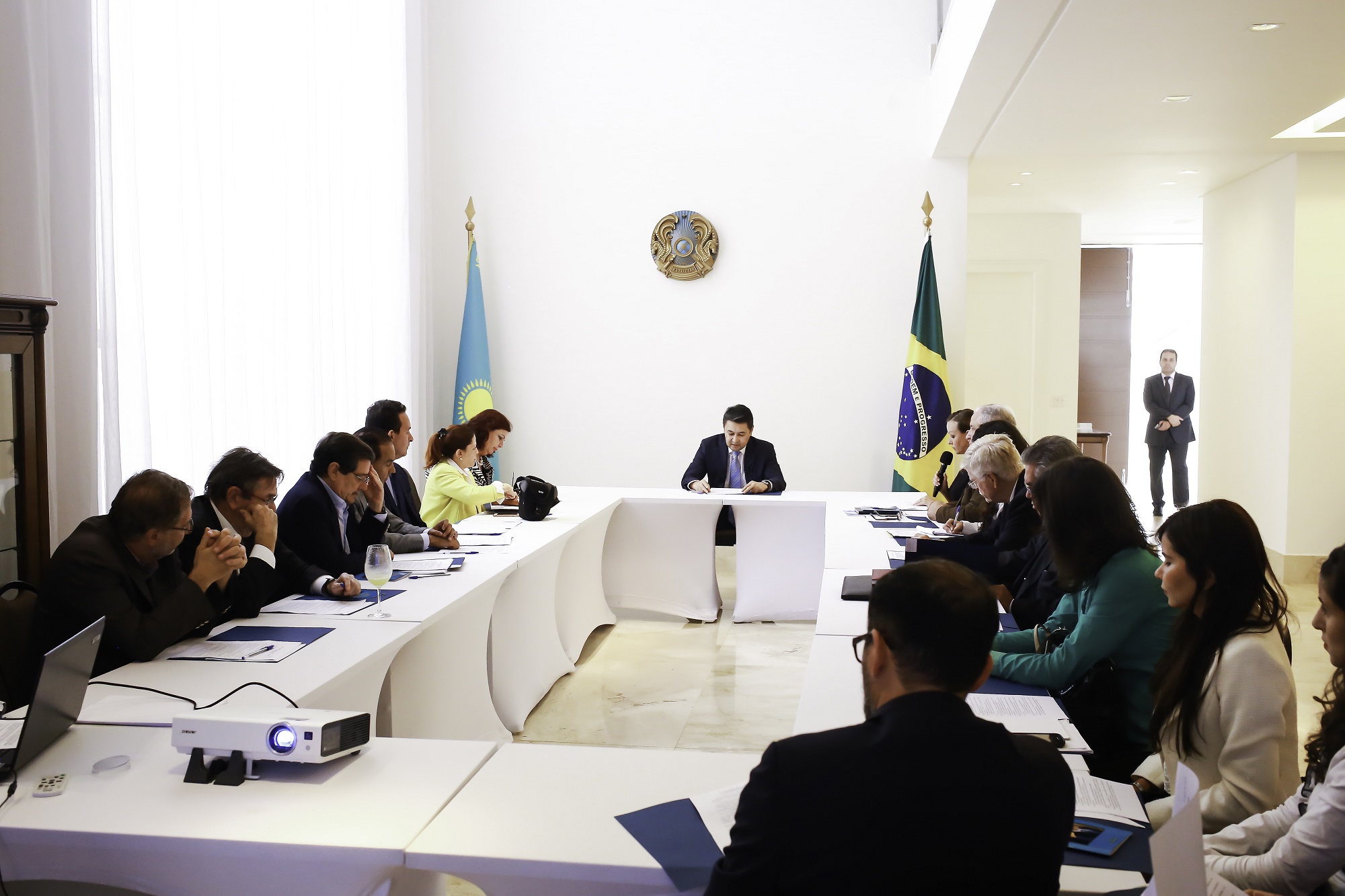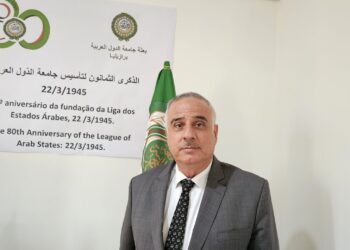Ambassador Kairat Sarzhanov, in an interview, on 13/02 at the embassy, explained measures taken and the government’s priorities to ensure an even more promising future.
Súsan Faria
Located in Central Asia, Kazakhstan has 25 years of independence, which is being marked by extensive government reform. The main focus of the reform is the redistribution of powers, where the President delegates some of his functions to Parliament and the government, decentralizing decision-making. In a meeting with guests, among them Embassy Brasilia Magazine, the ambassador of Kazakhstan in Brazil, Kairat Sarzhanov, highlighted the main points of this reform.
Political reform in Kazakhstan, according to the diplomat, the reform model being carried out in Kazakhstan is practiced in democratic countries and is open to public consultation from January 26 of this year until the 26th of this month. According to Sarzhanov, everything is being structured to meet the needs of the country and in response to modern challenges. “We are building a bridge to the future,” he said.
In a recent speech, the President of Kazakhstan, Nursultan Nazarbayev, explains that the reform aims to improve the executive efficiency. “The speed and complexity of social processes are growing in Kazakhstan,” he said.
The reform envisages that the President of Kazakhstan has strategic priorities as, focusing on foreign policy, national security and defense of the country. It will have the function of supreme arbiter in the relations between the government powers. New laws will transfer about 40 functions of the President to Parliament and government. The winning party in the parliamentary elections will have a decisive influence on the formation of the government.
During the debate, after the presentation by the ambassador of Kazakhstan, Ulysses Riedel, the lawyer and president of the Planetary Union, praised the fact that a President of the Republic gave up some of his constitutional powers for the benefit of his country and also the fact that Kazakhstan To hold every two years the World Forum of Culture for Peace, which houses cardinals, rabbis, Protestants and other religious representatives in the quest for philosophical approach.
Ambassador Sarzhanov also highlighted the five priorities of the “Third modernization of Kazakhstan: Global Competitiveness”, outlined in the Address of the President of Kazakhstan Nursultan Nazarbayev to the People of kazakhstan, i.e. accelerate technological modernization, especially the digital area; enable businesses and partnerships in Education, Agriculture and Transportation, with a new development model; macroeconomic stability; improving quality in areas such as Education and Housing; and fight against corruption.
One of the economic reform’s goals is to make Kazakhstan’s economy strong. “We want to become one of the 30 most developed countries in the world by 2050,” said the ambassador. Asked by EMBASSY BRASÍLIA MAGAZINE about which interests Kazakhstan has as priorities with Brazil, the ambassador said that it is high technology and electricity in general and that there will be a reduction of taxes for those who wish to invest in their country.
History – Kazakhstan was the last country to become independent with the dissolution of the Soviet Union in 1991. The current President, Nursultan Nazarbayev, has been the national leader ever since. The country lives mainly on oil, it has 131 ethnic groups, between Kazakhs, Russians, Uzbeks, Ukrainians, Germans, Tartars and Uyghurs. Islam is the predominant religion. The Kazakh language is the official language, followed by the Russian
Cazaquistão impulsiona reforma para o desenvolvimento
Embaixador Kairat Sarzhanov, em uma entrevista, em 13/02 na embaixada, explicou medidas tomadas e as prioridades do governo para garantir um futuro ainda mais promissor.
Súsan Faria
Localizado na Ásia Central, o Cazaquistão tem 25 anos de independência, que está sendo marcada por uma extensa reforma do governo. O foco principal da reforma é a redistribuição de poderes, onde o Presidente delega algumas de suas funções ao Parlamento e ao governo, descentralizando a tomada de decisões. Em encontro com convidados, entre eles a Revista Embaixada de Brasília, o embaixador do Cazaquistão no Brasil, Kairat Sarzhanov, destacou os principais pontos dessa reforma.
O modelo de reforma política no Cazaquistão, de acordo com o diplomata, é praticado em países democráticos e está aberto a consulta pública desde o dia 26 de janeiro deste ano até o próximo dia 26 de fevereiro. De acordo com Sarzhanov, tudo está sendo estruturado para atender às necessidades do país e em resposta aos desafios modernos. “Estamos construindo uma ponte para o futuro”, disse ele.
Em um discurso recente, o presidente do Cazaquistão, Nursultan Nazarbayev, explica que a reforma visa melhorar a eficiência executiva. “A velocidade e a complexidade dos processos sociais estão crescendo no Cazaquistão”, disse ele.
A reforma prevê que o Presidente do Cazaquistão tenha prioridades estratégicas como, com foco na política externa, segurança nacional e defesa do país. Terá a função de árbitro supremo nas relações entre os poderes do governo. Novas leis transferirão cerca de 40 funções do Presidente ao Parlamento e ao governo. O partido vencedor nas eleições parlamentares terá uma influência decisiva sobre a formação do governo.
Durante o debate, após a apresentação do embaixador do Cazaquistão, Ulysses Riedel, advogado e presidente da União Planetária, elogiou o fato de um Presidente da República renunciar a alguns dos seus poderes constitucionais em benefício do seu país, O fato de o Cazaquistão realizar, de dois em dois anos, o Fórum Mundial da Cultura pela Paz, que acolhe cardeais, rabinos, protestantes e outros representantes religiosos na busca da abordagem filosófica.
Embaixador Sarzhanov também destacou as cinco prioridades da “Terceira modernização do Cazaquistão: Competitividade Global”, delineado no discurso do Presidente do Cazaquistão Nursultan Nazarbayev para o povo do Kazaquistão, ou seja, acelerar a modernização tecnológica, especialmente a área digital; Capacitar empresas e parcerias em Educação, Agricultura e Transporte, com um novo modelo de desenvolvimento; Estabilidade macroeconômica; Melhorar a qualidade em áreas como Educação e Habitação; e lutar contra a corrupção.
Um dos objetivos da reforma econômica é tornar a economia do Cazaquistão forte. “Queremos nos tornar um dos 30 países mais desenvolvidos do mundo até 2050”, disse o embaixador. Perguntado por EMBASSY BRASÍLIA MAGAZINE sobre quais interesses o Cazaquistão tem como prioridades com o Brasil, o embaixador disse que é alta tecnologia e eletricidade em geral e que haverá uma redução de impostos para aqueles que desejam investir em seu país.
História – O Cazaquistão foi o último país a tornar-se independente com a dissolução da União Soviética em 1991. O atual presidente, Nursultan Nazarbayev, tem sido o líder nacional desde então. O país vive principalmente de petróleo, tem 131 grupos étnicos, entre cazaques, russos, uzbeques, ucranianos, alemães, tártaros e uigures. O Islam é a religião predominante. A língua cazaque é a língua oficial, seguida pela língua russa.















